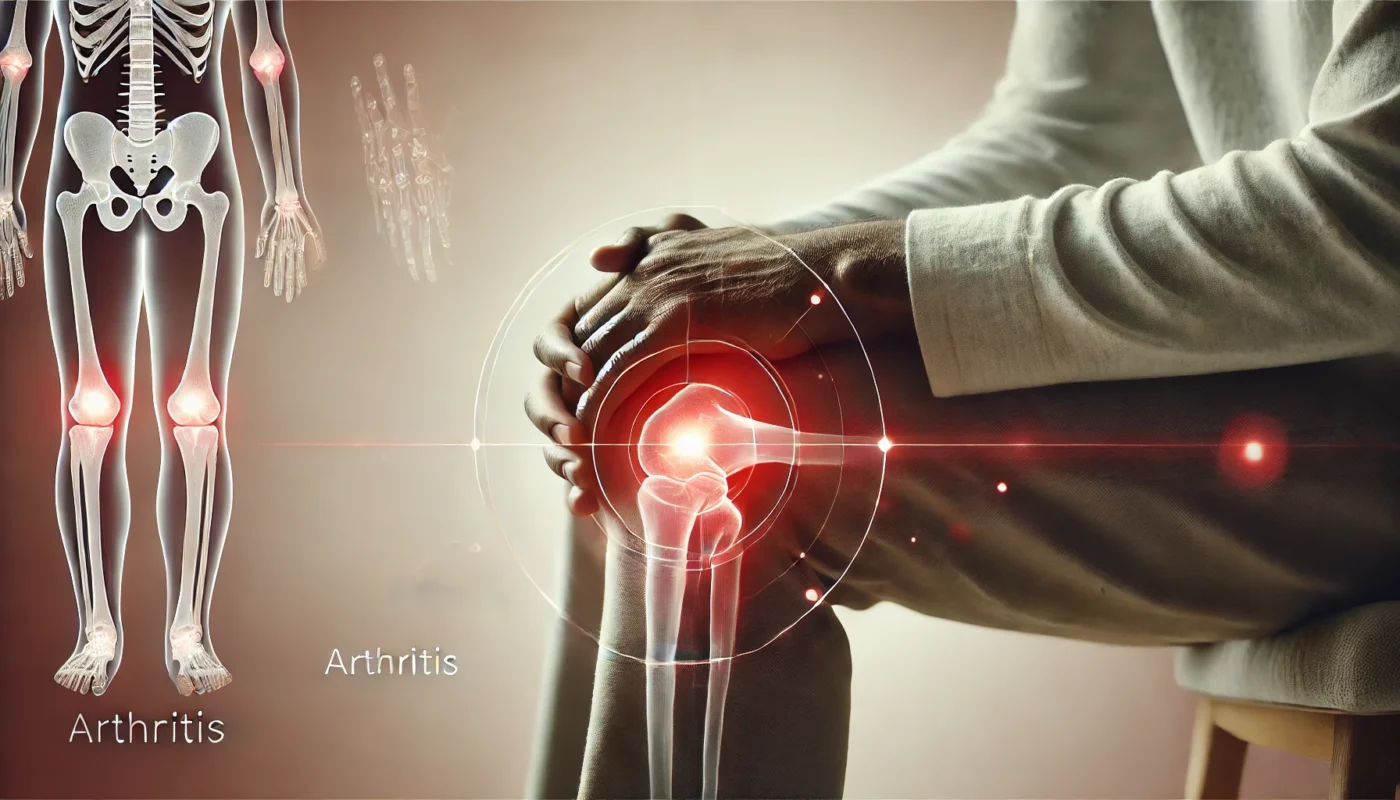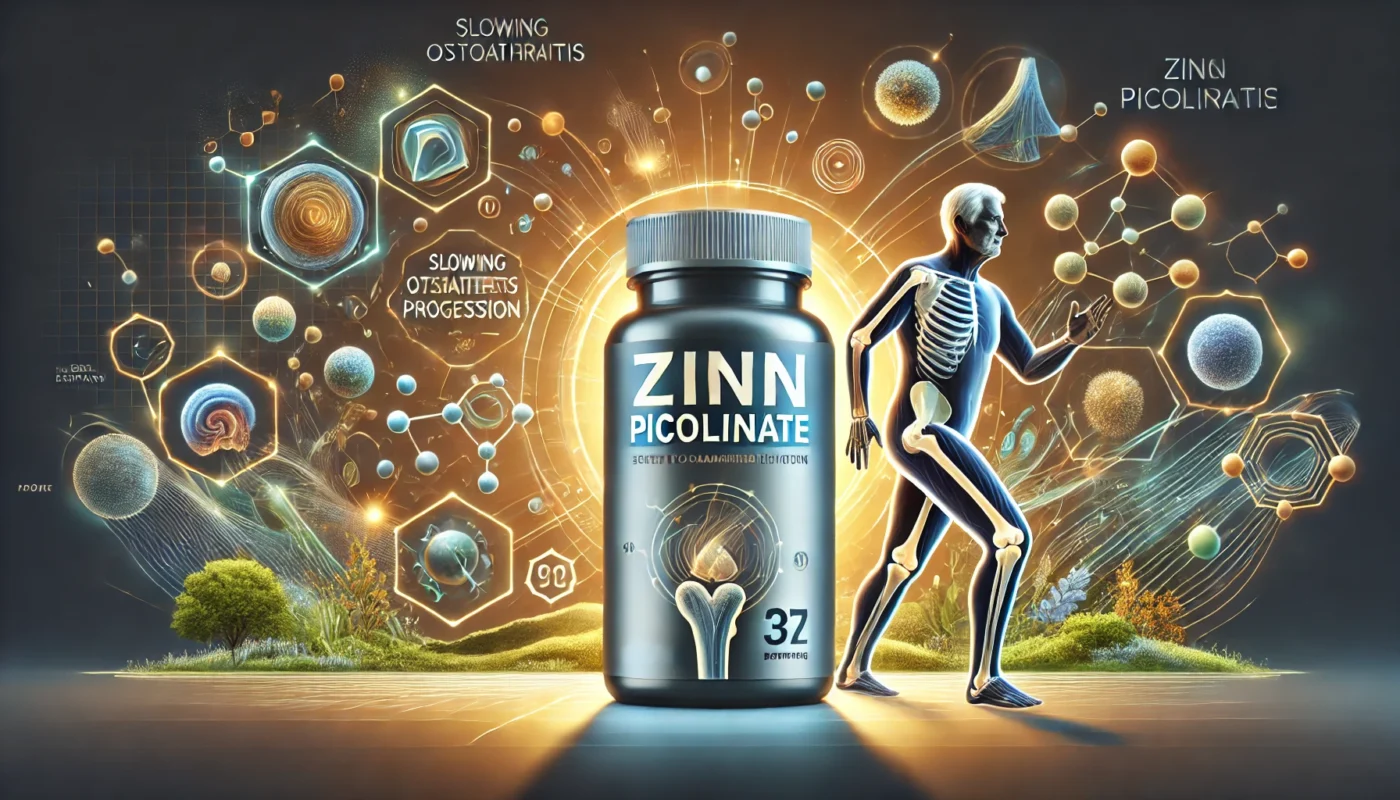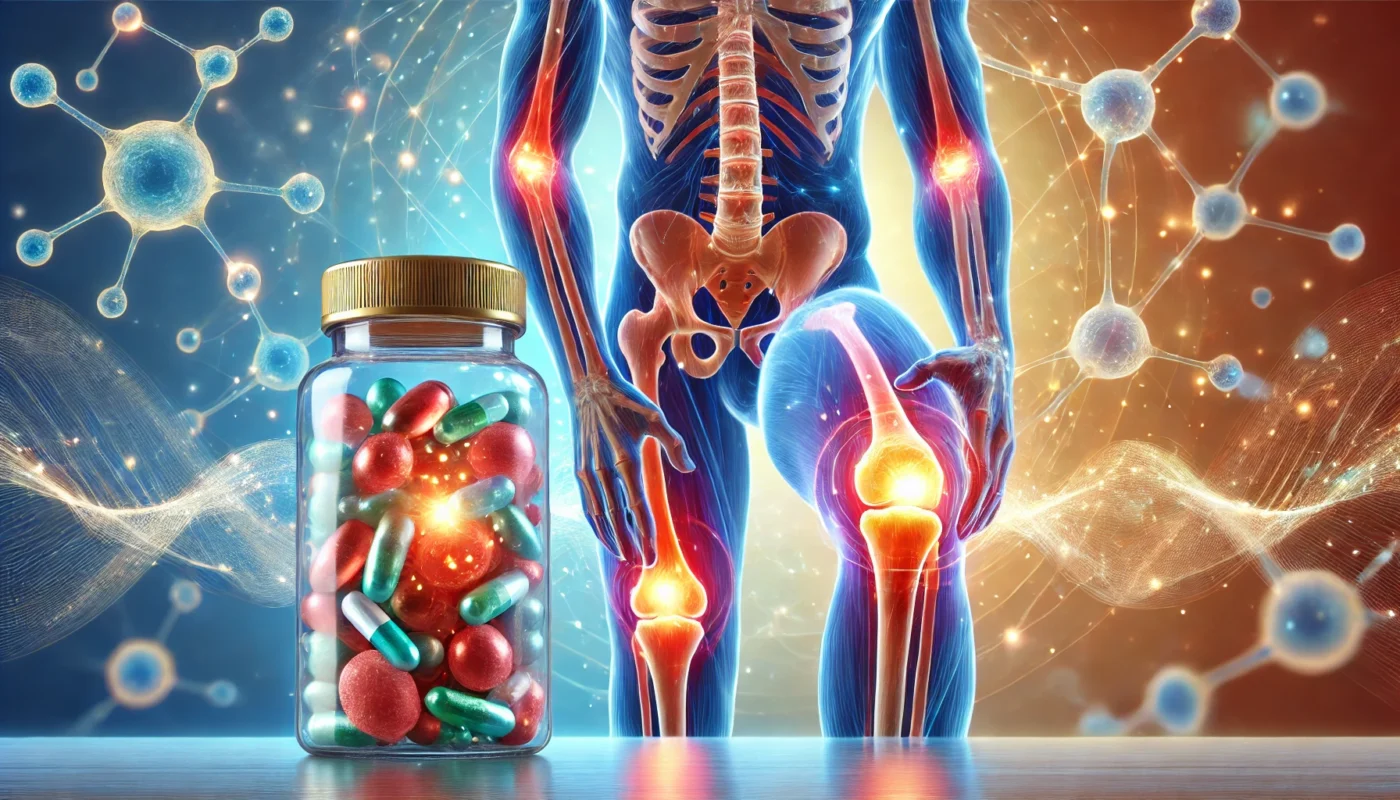Osteoarthritis (OA) is a degenerative joint disease that affects millions of people worldwide. Characterized by the gradual breakdown of cartilage, inflammation, and joint pain, OA can significantly impair mobility and quality of life. While there is no cure for osteoarthritis, nutritional strategies and supplements, such as zinc picolinate, have gained attention for their potential to slow disease progression and improve joint health.
Zinc is a critical trace mineral involved in numerous physiological processes, including cartilage repair, inflammation modulation, and antioxidant defense. Zinc picolinate, a highly bioavailable form of zinc, ensures effective absorption and delivery to the joints, making it a promising tool in osteoarthritis management. This article explores the role of zinc picolinate in supporting joint health, reducing cartilage degradation, and alleviating OA symptoms.
You May Also Like:
How Zinc Picolinate Supports Muscle Growth in Men: What You Need to Know
Zinc Picolinate for Immune-Compromised Individuals: What Do You Need to Know?
The Role of Zinc Picolinate in Slowing Osteoarthritis Progression is an original (HSLHealing) article.
Understanding Osteoarthritis and Its Causes
Osteoarthritis is the most common form of arthritis, typically affecting weight-bearing joints such as the knees, hips, and spine. It occurs when the protective cartilage cushioning the ends of bones gradually wears down, leading to pain, stiffness, and inflammation.
Key Factors in Osteoarthritis Development:
- Cartilage Degradation: Breakdown of cartilage results in friction between bones.
- Inflammation: Chronic inflammation exacerbates joint damage.
- Oxidative Stress: Free radicals damage cartilage cells, accelerating degeneration.
- Imbalance in Joint Repair: The body’s ability to repair damaged cartilage declines with age.
Nutritional deficiencies, including low zinc levels, can worsen these processes, making zinc supplementation a potential therapeutic strategy.
The Importance of Zinc in Joint Health
Zinc plays a pivotal role in maintaining healthy joints and preventing cartilage degradation:
- Cartilage Maintenance:
Zinc supports the production of collagen and proteoglycans, key components of cartilage. - Reducing Inflammation:
Zinc regulates the release of pro-inflammatory cytokines, helping to reduce joint inflammation. - Antioxidant Defense:
Zinc acts as a cofactor for superoxide dismutase (SOD), an enzyme that neutralizes free radicals and protects cartilage cells from oxidative damage. - Enzymatic Regulation:
Zinc inhibits matrix metalloproteinases (MMPs), enzymes that break down cartilage. - Supporting Bone Health:
Zinc promotes bone mineralization, maintaining joint stability and reducing the risk of fractures.

What Is Zinc Picolinate?
Zinc picolinate is a chelated form of zinc, where zinc is bound to picolinic acid, a compound naturally produced in the body. This binding enhances zinc absorption, making it more bioavailable than other forms like zinc oxide or zinc sulfate. For individuals with osteoarthritis, who may have impaired nutrient absorption or increased zinc requirements, zinc picolinate ensures effective delivery to joint tissues.
How Zinc Picolinate Slows Osteoarthritis Progression
1. Reducing Cartilage Degradation
Cartilage breakdown is a hallmark of osteoarthritis. Zinc picolinate inhibits the activity of matrix metalloproteinases (MMPs), enzymes responsible for degrading cartilage.
- Study Insight: Research in Arthritis Research & Therapy found that zinc supplementation reduced MMP activity by 35%, preserving cartilage integrity in OA patients.
2. Modulating Inflammation
Chronic inflammation accelerates joint damage and worsens OA symptoms. Zinc picolinate regulates immune responses and reduces the production of pro-inflammatory cytokines such as interleukin-6 (IL-6) and tumor necrosis factor-alpha (TNF-α).
- Clinical Evidence: A study in Nutrients reported that zinc supplementation decreased inflammatory markers by 28%, alleviating pain and improving joint function in individuals with OA.
3. Enhancing Antioxidant Defense
Oxidative stress damages chondrocytes (cartilage cells) and contributes to cartilage degeneration. Zinc picolinate boosts antioxidant defenses, protecting cartilage from free radical damage.
- Research Finding: A study in Free Radical Biology and Medicine demonstrated that zinc supplementation increased superoxide dismutase (SOD) activity, reducing oxidative damage in joint tissues by 30%.
4. Supporting Cartilage Repair and Regeneration
Zinc picolinate supports the synthesis of collagen and glycosaminoglycans, essential components of cartilage. It also enhances chondrocyte function, promoting cartilage repair.
- Evidence: A study in Journal of Orthopaedic Research found that zinc supplementation improved collagen synthesis in cartilage by 20%, slowing the progression of OA.
5. Promoting Bone Health
Osteoarthritis often involves changes in subchondral bone, the layer of bone beneath the cartilage. Zinc picolinate supports bone remodeling, maintaining joint stability.
- Study Insight: Research in Journal of Bone and Mineral Research showed that zinc supplementation improved bone density by 15% in individuals with OA, reducing joint instability.
6. Alleviating Joint Pain and Stiffness
By reducing inflammation and oxidative stress, zinc picolinate alleviates common OA symptoms, including pain and stiffness.
- Clinical Evidence: A study in Rheumatology International reported that zinc supplementation reduced pain scores by 25% in OA patients, improving their quality of life.

Zinc Deficiency and Osteoarthritis Risk
Zinc deficiency is common in individuals with osteoarthritis due to dietary factors, chronic inflammation, and increased zinc excretion. This deficiency can exacerbate cartilage degradation and joint inflammation.
Symptoms of Zinc Deficiency in Joint Health:
- Increased joint pain and stiffness
- Delayed recovery from joint injuries
- Fatigue and low energy levels
- Slow wound healing
Statistics:
- A study in Clinical Nutrition found that 40% of individuals with osteoarthritis had suboptimal zinc levels, correlating with increased cartilage loss and pain severity.
Dietary Sources of Zinc
While supplementation with zinc picolinate is effective, incorporating zinc-rich foods into the diet can further support joint health. Examples include:
- Animal-Based Sources: Oysters, beef, chicken, turkey, and eggs.
- Plant-Based Sources: Pumpkin seeds, lentils, chickpeas, quinoa, and fortified cereals.
For those with dietary restrictions or higher zinc needs, zinc picolinate provides a reliable solution.
Recommended Dosage and Safety
The recommended dietary allowance (RDA) for zinc is:
- Adult men: 11 mg/day
- Adult women: 8 mg/day
For managing osteoarthritis, therapeutic doses of zinc picolinate typically range from 20–30 mg/day. However, excessive zinc intake (above 40 mg/day) can cause:
- Nausea
- Reduced copper absorption
- Gastrointestinal discomfort
Note: Always consult a healthcare provider before starting supplementation to ensure proper dosage and safety.

Integrating Zinc Picolinate into an Osteoarthritis Management Plan
- Combine with Anti-Inflammatory Foods: Include foods rich in omega-3 fatty acids, turmeric, and antioxidants to support joint health.
- Incorporate Low-Impact Exercises: Activities like swimming, yoga, or cycling reduce joint strain while improving mobility.
- Stay Consistent: Take zinc picolinate daily to ensure sustained benefits for joint health.
- Monitor Symptoms: Track changes in pain, stiffness, and mobility after starting supplementation.
Who Can Benefit from Zinc Picolinate?
- Individuals with Osteoarthritis: Zinc picolinate addresses cartilage degradation and inflammation.
- Older Adults at Risk of OA: Zinc supplementation supports joint health and prevents cartilage loss.
- Athletes with Joint Strain: Zinc enhances recovery and protects joints from overuse injuries.
- People with Nutritional Deficiencies: Zinc picolinate ensures effective absorption and delivery to joint tissues.
Future Research Directions
While current studies support zinc picolinate’s benefits for osteoarthritis, further research could explore:
- Its long-term effects on joint function and quality of life in OA patients.
- Synergistic effects with other joint-supporting supplements, such as glucosamine and chondroitin.
- Zinc’s role in preventing osteoarthritis onset in high-risk populations.
Conclusion: Zinc Picolinate for Joint Health
Zinc picolinate offers a promising solution for slowing osteoarthritis progression and supporting joint health. By reducing inflammation, enhancing antioxidant defenses, and promoting cartilage repair, zinc picolinate addresses the underlying factors contributing to joint degeneration and OA symptoms.
For individuals seeking a natural and effective strategy to manage osteoarthritis, incorporating zinc picolinate into a comprehensive care plan provides significant benefits. As always, consult with a healthcare provider to tailor supplementation to your specific needs and ensure safe and effective use.

References
- Zinc and Cadmium in the Aetiology and Pathogenesis of Osteoarthritis and Rheumatoid Arthritis. Retrieved from: https://pmc.ncbi.nlm.nih.gov/articles/PMC7824316/
- The influence of zinc levels on osteoarthritis: A comprehensive review. Retrieved from: https://www.cambridge.org/core/journals/nutrition-research-reviews/article/influence-of-zinc-levels-on-osteoarthritis-a-comprehensive-review/C70C5214634B3B68401FACFDAFCA6674
- The Impact of Trace Elements on Osteoarthritis. Retrieved from: https://pmc.ncbi.nlm.nih.gov/articles/PMC8732765/
- Pathogenesis of Osteoarthritis: Risk Factors, Regulatory Pathways in Chondrocytes, and Experimental Models. Retrieved from: https://www.mdpi.com/2079-7737/9/8/194
- Zinc supplementation improves bone density in patients with thalassemia: a double-blind, randomized, placebo-controlled trial. Retrieved from: https://pmc.ncbi.nlm.nih.gov/articles/PMC3778866/
Important Note: The information contained in this article is for general informational purposes only, and should not be construed as health or medical advice, nor is it intended to diagnose, prevent, treat, or cure any disease or health condition. Before embarking on any diet, fitness regimen, or program of nutritional supplementation, it is advisable to consult your healthcare professional in order to determine its safety and probable efficacy in terms of your individual state of health.
Regarding Nutritional Supplements Or Other Non-Prescription Health Products: If any nutritional supplements or other non-prescription health products are mentioned in the foregoing article, any claims or statements made about them have not been evaluated by the U.S. Food and Drug Administration, and such nutritional supplements or other health products are not intended to diagnose, treat, cure, or prevent any disease.

